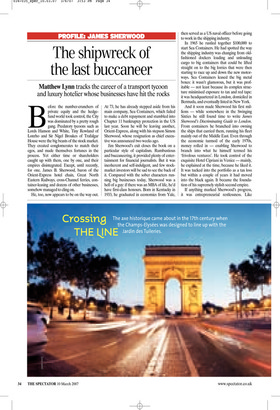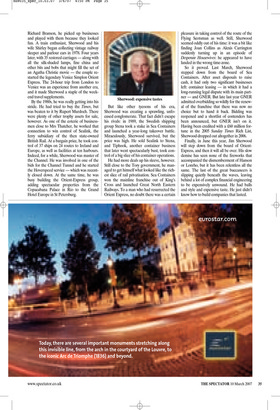The shipwreck of the last buccaneer
Matthew Lynn tracks the career of a transport tycoon and luxury hotelier whose businesses have hit the rocks Before the number-crunchers of private equity and the hedgefund world took control, the City was dominated by a pretty rough gang. Predatory tycoons such as Lords Hanson and White, Tiny Rowland of Lonrho and Sir Nigel Broakes of Trafalgar House were the big beasts of the stock market. They created conglomerates to match their egos, and made themselves fortunes in the process. Yet either time or shareholders caught up with them, one by one, and their empires disintegrated. Except, until recently, for one. James B. Sherwood, baron of the Orient-Express hotel chain, Great North Eastern Railways, cross-Channel ferries, container-leasing and dozens of other businesses, somehow managed to cling on.
sp adv ep
He, too, now appears to be on the way out. At 73, he has already stepped aside from his main company, Sea Containers, which failed to make a debt repayment and stumbled into Chapter 11 bankruptcy protection in the US last year. Soon he will be leaving another, Orient-Express, along with his stepson Simon Sherwood, whose resignation as chief executive was announced two weeks ago.
Jim Sherwood’s exit closes the book on a particular style of capitalism. Rumbustious and buccaneering, it provided plenty of entertainment for financial journalists. But it was incoherent and self-indulgent, and few stockmarket investors will be sad to see the back of it. Compared with the sober characters running big businesses today, Sherwood was a hell of a guy: if there was an MBA of life, he’d have first-class honours. Born in Kentucky in
10:360
1933, he graduated in economics from Yale, then served as a US naval officer before going to work in the shipping industry.
In 1965 he rustled together $100,000 to start Sea Containers. He had spotted the way the shipping industry was changing from oldfashioned dockers loading and unloading cargo to big containers that could be lifted straight on to the big lorries that were then starting to race up and down the new motorways. Sea Containers leased the big metal boxes: it wasn’t glamorous, but it was profitable — not least because its complex structure minimised exposure to tax and red tape: it was headquartered in London, domiciled in Bermuda, and eventually listed in New York.
And it soon made Sherwood his first millions — while somewhere in the Swinging Sixties he still found time to write James Shervood’s Discriminating Guide to London. From containers he branched into owning the ships that carried them, running his fleet mainly out of the Middle East. Even through the economic turmoil of the early 1970s, money rolled in — enabling Sherwood to branch into what he himself termed his ‘frivolous ventures’. He took control of the exquisite Hotel Cipriani in Venice — mainly, he explained at the time, because he liked it. It was tucked into the portfolio as a tax loss but within a couple of years it had moved into the black again. It became the foundation of his supremely stylish second empire.
If anything marked Sherwood’s progress, it was entrepreneurial restlessness. Like Richard Branson, he picked up businesses and played with them because they looked fun. A train enthusiast, Sherwood and his wife Shirley began collecting vintage railway sleeper and parlour cars in 1978. Four years later, with 35 restored carriages — along with all the silk-shaded lamps, fine china and other bits and bobs that might fill the set of an Agatha Christie movie — the couple restarted the legendary Venice Simplon Orient Express. The 24-hour trip from London to Venice was an experience from another era, and it made Sherwood a staple of the weekend travel supplements.
By the 1980s, he was really getting into his stride. He had tried to buy the Times, but was beaten to it by Rupert Murdoch. There were plenty of other trophy assets for sale, however. As one of the coterie of businessmen close to Mrs Thatcher, he worked that connection to win control of Sealink, the ferry subsidiary of the then state-owned British Rail. At a bargain price, he took control of 37 ships on 24 routes to Ireland and Europe, as well as facilities at ten harbours. Indeed, for a while, Sherwood was master of the Channel. He was involved in one of the bids for the Channel Tunnel and he started the Hoverspeed service — which was recently closed down. At the same time, he was busy building the Orient-Express group, adding spectacular properties from the Copacabana Palace in Rio to the Grand Hotel Europe in St Petersburg. But like other tycoons of his era, Sherwood was creating a sprawling, unfocused conglomerate. That fact didn’t escape his rivals: in 1989, the Swedish shipping group Stena took a stake in Sea Containers and launched a year-long takeover battle. Miraculously, Sherwood survived, but the price was high. He sold Sealink to Stena, and Tiphook, another container business that later went spectacularly bust, took control of a big slice of his container operations.
He had more deals up his sleeve, however. Still close to the Tory government, he managed to get himself what looked like the richest slice of rail privatisation. Sea Containers won the mainline franchise out of King’s Cross and launched Great North Eastern Railways. To a man who had resurrected the Orient Express, no doubt there was a certain pleasure in taking control of the route of the Flying Scotsman as well. Still, Sherwood seemed oddly out of his time: it was a bit like finding Joan Collins as Alexis Carrington suddenly turning up in an episode of Desperate Housewives: he appeared to have landed in the wrong time-zone.
So it proved. Last March, Sherwood stepped down from the board of Sea Containers. After asset disposals to raise cash, it had only two significant businesses left: container leasing — in which it had a long-running legal dispute with its main partner — and GNER. But late last year GNER admitted overbidding so wildly for the renewal of the franchise that there was now no choice but to hand it back. Bidding was reopened and a shortlist of contenders has been announced, but GNER isn’t on it. Having been credited with a £60 million fortune in the 2005 Sunday Times Rich List, Sherwood dropped out altogether in 2006.
Finally, in June this year, Jim Sherwood will step down from the board of OrientExpress, and then it will all be over. His slow demise has seen none of the fireworks that accompanied the dismemberment of Hanson or Lonrho, but it has been relentless all the same. The last of the great buccaneers is slipping quietly beneath the waves, leaving behind a lot of complex financial engineering to be expensively unwound. He had balls and style and expensive taste. He just didn’t know how to build companies that lasted.



























































































 Previous page
Previous page